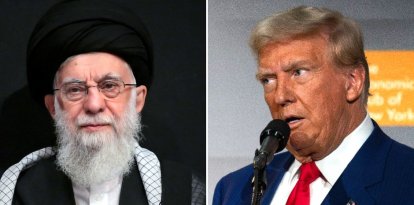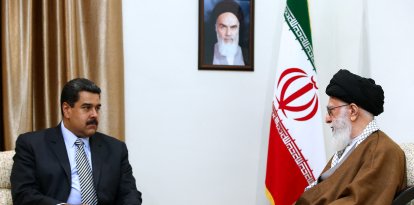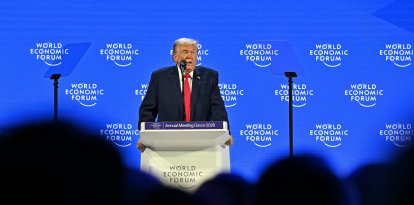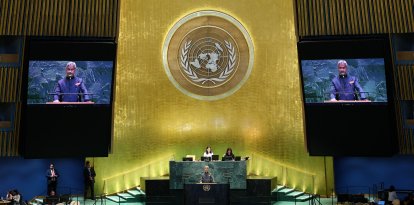Crisis and rebirth of a nation. Milei's new Argentina
Milei represents the possibility of a diametric change, an almost unique opportunity for a country that otherwise risks becoming a southern Venezuela.

(Wikimedia Commons / Unsplash / YouTube Javier Milei)
We still don't know if Javier Milei will win the elections, but one thing is certain: Argentina will no longer be what it was before, because with Milei and Victoria Villarruel (his candidate for vice president) many topics and concepts have been unlocked that until just a few months ago were literally taboo: one could not speak well of liberalism, because immediately whoever did it was branded as an imperialist, a capitalist, or a slave to the "gringos," an enemy of the people; conservatism could not be mentioned, which the main parties despise as far-right traditionalism and even coup militarism; It was frowned upon to talk about private initiatives ‒industrial or artisanal‒ considered by the populist mainstream as an expression of individualistic selfishness and exploitation of workers; and the victims of left-wing terrorism could not be remembered, because - it is commonly believed - on the left there had only been angelic movements, persecuted by the violent right and which, therefore, would have been forced to take up arms to defend themselves. Today we have begun to talk about all this, to tear the veil of demagoguery and lies, and there will be no retreat from this progress, regardless of the electoral result.
Thanks to Milei and Villarruel, Argentina will be a better in terms of political awareness of citizens, in terms of the possibility of speaking and applying the principles of liberalism and the values of conservatism, and therefore it will surely be freer, and with Milei as president as well, it will be infinitely more stable from an economic and social point of view. But the current situation in the country is undoubtedly dramatic. An economic-financial crisis, perhaps even more serious than the one that led the country to a devastating bankruptcy in 2001, has been hitting it, to such an extent that today many analysts speak of an announced or even imminent default.
It is to be hoped - first of all for the good of the Argentines, but also for the already difficult balance of the Western economic financial system and, therefore, for the security of the complicated Western geopolitical system - that this is not the result of the current crisis. However, it is true that after more than twenty years of leftist government, interrupted only by Macri's center-left government from 2015 to 2019, Argentina is exhausted, at the limit of its economic and psychological strength, shaken by a level of inflation that exceeds 120 percent annually; disoriented by government measures that border on madness (such as the specific impediment for citizens to buy products from abroad, the strong exchange restrictions or the almost exponential increase in public subsidies at the expense of private taxpayers, increasingly scarce and more poor); blackmailed by unions that look like business committees, powerful enough to impose any abuse, even the takeover of factories or companies; frightened by a crime that - with the complicity of hyperpermissive legislation and a weakening of police forces - is spreading everywhere, making security an issue as tragic as the economic one.
The triple consecutive presidency of Néstor Kirchner and his wife Cristina, from 2003 to 2015, and the Peronist four-year term that is about to conclude at the end of 2023 - in which the irrational and devastating management of the pandemic is also inserted (endless and useless stoppages, which forced thousands of healthy companies to close their doors)-, have damaged the productive machinery and the social apparatus from a country that was already deeply marked by political dishonesty and rampant corruption (Argentina is ranked 78th in the world ranking that begins with the least corrupt nation). A strange decline for a nation that in 1895 had the highest GDP in the world, which has enormous natural resources, vast territories, a high cultural level and a population with a great spirit of initiative.
The explanation for this discouraging decline lies mainly in the distortion with which its political class has been conceiving the State or the public good: national interest subordinated to personal interest; state wealth used as ATMs to line their pockets; politics as a means to obtain loot even more than as a tool to impose an ideology; definitely, ethics replaced by chicharrón (“la cotica”), Enrico Montesano would say. Pathologies that are certainly widespread in the world, but that in Argentina have had exceptionally disturbing effects, because together they have contributed to making it a country in which, as Mariano Grondona, a refined political scientist and one of the most brilliant intellectuals, wrote Argentines, "The bureaucracy has tried to replace the bourgeoisie through statism or subordinate it through welfareism” – an infamous and, sadly, successful attempt. Thus was born the progressive paralysis that today grips the most "European" nation in Latin America.
To designate this perverse mechanism of the bureaucratic-political system, Emilio Perina, a deep connoisseur of the labyrinths of power, had coined an iconic expression in 1981: “the impeding machine,” that machine that is activated to prevent those who want to produce from being activated. A colossal hulk that controls and suffocates not only entrepreneurial activity but any other socioeconomic exercise: that is what the Argentine State has gradually become. The similarities with national realities such as Italy or some other European countries are many and notable, but it must be recognized that the Argentine political-bureaucratic-welfare mechanism is difficult to match in its paralyzing effects.
And it is precisely in this hyperinflationary, economically depressed, culturally narcotized and socially explosive reality - victim of Kirchnerism, unionism, progressivism, Marxism and political correctness - that the liberal, "liberist" and libertarian candidate Milei has been leading, together to the conservative Vicky Villarruel, an electoral campaign that could be decisive for the rebirth or the definitive collapse of his nation.
Those of October 22 will not be presidential elections like the others, close and difficult, but always in a context of not enormous differences between the main contenders. Today, the differences between Milei and the other candidates are abysmal, not only different visions, but different worlds. Therefore, Milei represents the possibility of a diametric change, of a total change of course, an almost unique opportunity for a country that otherwise runs the risk of transforming into a southern Venezuela, both economically and politically. I am not dramatizing: this is truly the risk faced today by a country potentially capable of being on par with many advanced nations, but in reality so backward – in the sense described above – that it arouses sadness and indignation.
Now Milei's victory is no longer as unthinkable as it was just a few months ago, on the contrary, it is highly probable, so much so that the system, which Milei defines as "the caste," is playing all its cards, even with traps, to try to avoid it. But in the meantime, as a first step, against all the closest polls, on August 13 Milei won the presidential primaries (the PASO) with a hopeful 30 percent, after which we see a series of events to excite the already convinced voters and raise awareness among those who are not yet convinced, with the polls showing a difference of at least ten points with respect to the other two candidates with whom he will compete in October.
In Italy, much of the press and observers have classified him as populist, neo-fascist or new generation Peronist. Incorrect, false and instrumental definitions. Milei follows the teachings of Friedman, Hayek and Mises and therefore imagines for his country a general renaissance in the style of Friedmanian monetarism, Hayekian liberalism and Misesian liberal conservatism. Liberal center-right, nothing to do with populism or fascism. Productive propulsion, not Peronism. Free market in a free state, and at the same time maximum freedom of initiative and minimum state intervention.
In fact, freeing private initiative means freeing the entire country from the ties with which a totally self-referential power, in the midst of the delirium of a social control that becomes surreal control (one example among many: today to request a quote in a business of any kind you even have to show your identity document), and which becomes a vehicle of unbridled corruption, has been absurdly exasperating daily life and subjugating the population, which by necessity he becomes accustomed to any type of humiliation , but at the same time, on the contrary, he begins to talk about freedom, not only the formal and ideal freedom of the Constitution, but the effective, concrete one; freedom hidden by a power that plunders wealth and kidnaps consciences, a freedom denied.
Freeing people's minds means leaving them the keys to their own destiny, with all the responsibility that this implies; releasing private initiative means encouraging it and, therefore, liberating society itself, returning to citizens the dignity and autonomy that have been taken from them during decades of political and bureaucratic abuse. But Milei's integral libertarianism is not only a tireless defense of individual freedom, but also a practicable way of uniting the individual with his nation, which is understood here neither as a closed commercial state nor as an open territory in which Anyone can command, but as a place where a people can display their own identity when interacting with those of other friendly nations or even simply interlocutors.
This seems to be the renaissance plan that Milei and Villarruel have in mind for Argentina. It is possible that the bureaucratic and union system will hinder their plan by all means, even the least licit, so it will be decisive that both can count not only on the active support of their voters, but also on the loyal support of other reasonably close parties. That Milei emerges victorious from the October electoral challenge and can implement his government program is key, not so much for him, because age is on his side and in any case he could run within four years, but for his country, which you can no longer wait for a gear change that has never been so close and possible.

























